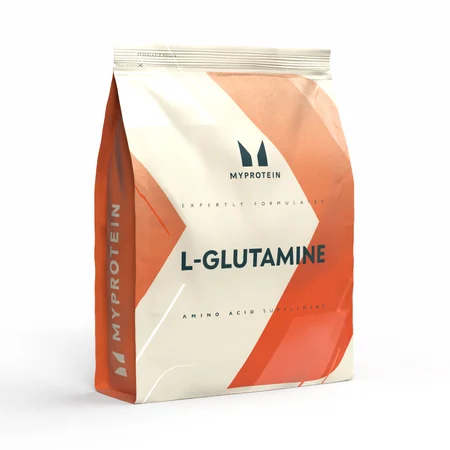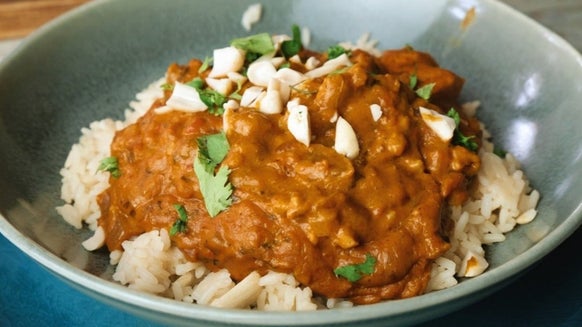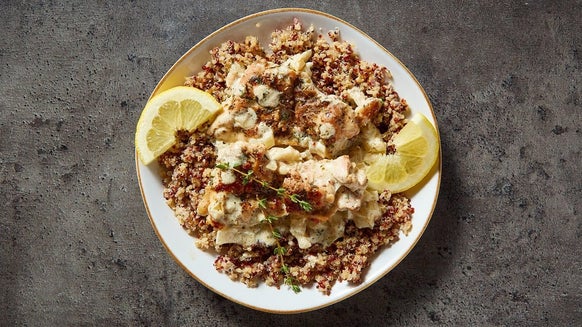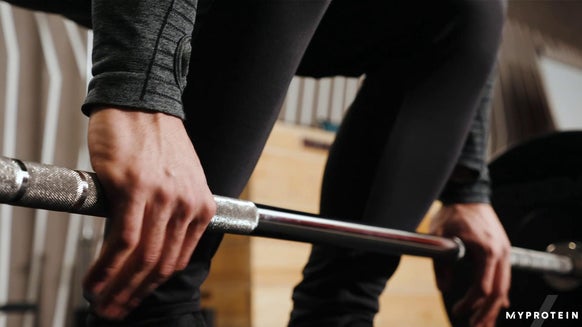
If it's good enough for Mr Olympia, then it may be good enough for you.
In case you hadn't heard of him, Phil Heath has won the Mr. Olympia title more times than we can count on one hand, which makes him one of the best professional bodybuilders in the world. The dietary supplements used by the man with the world's best body can therefore be considered by all individuals that are interested in optimising their nutrition and training.
Phil reports that during his pre-contest preparation, alongside whey protein and branched-chain amino acids, he'll consume another supplement up to three times per day – L-glutamine.
And Phil isn't on his own, either. Many athletes and gym-goers hail L-glutamine as one of their favourite supplements.
But what is L-glutamine? What does it do and how can it help you to improve your performance and physique? Read on to learn more.
You'll find in this article:
What Is Glutamine?
Glutamine (often called L-glutamine or 2,5-diamino-5-oxopentanoic acid) is the most abundant amino acid found in our blood[2] and makes up approximately 60% of the amino acid pool in our muscles[8]. It's found in two different forms: D-glutamine and L-glutamine, and the L-glutamine variation is found in nature.
It is considered conditionally essential, which means that in certain situations its synthesis (production in the body) can be limited (e.g. in premature infants or those in intensive care). In this circumstance it means that it would need to be consumed in the diet via food or supplementation.
It is synthesised predominantly in skeletal muscle (approximately 90%) by a process facilitated by the enzyme glutamine synthetase from the amino acid glutamate and glutamic acid[3].
In healthy individuals, it can be produced with no problem in the muscles, which are able to produce, store and release glutamine as required to maintain the appropriate glutamine blood concentration[4].
However, during some situations, the production of glutamine homeostasis is threatened, glutamine reserves in skeletal muscle are depleted, and the important functions of this amino acid are inhibited. Such situations would include various forms of catabolic stress ranging from infection, surgery and, importantly, exhaustive exercise.
What Does Glutamine Do? Muscle Growth
Glutamine is an amino acid known for its role as a substrate for protein synthesis[5]. This means it's used during skeletal muscle contraction when we exercise, and without its presence, our exercise performance and progress may be hindered.
This amino acid is an important anabolic precursor for muscle growth following exercise[6]. In fact, the anabolic effects of glutamine include both an increase in protein synthesis (muscle hypertrophy or increased number of muscle cells)[9] and increases in muscle cell expansion and filling with creatine, water and carbohydrate (muscle cell volumisation or “the pump”)[10].
The specific mechanisms of these benefits have not been fully explained, however, certain physiological actions have been attributed to glutamine concentration in muscle.
Important Amino Acid: Leucine
Firstly, increased glutamine content in muscle allows glutamine to suppress the oxidation (breakdown) of the branched-chain amino acid, leucine, and enhances the disposal of leucine without release of free radicals[9]. Free radicals are atoms with an unpaired electron which react with oxygen, resulting in cell damage.
The presence of leucine is key for muscle growth, as it regulates the initiation of muscle-protein synthesis, acting as a trigger for muscle tissue development[11]. Therefore, if glutamine can prevent leucine breakdown, it's thought to be able to facilitate muscle-protein synthesis.
The concentration of glutamine also promotes a positive nitrogen balance, which is required for muscle-protein synthesis[12]. There is also evidence that glutamine can also reduce muscle tissue catabolism (breakdown) by counteracting the effects of the stress chemical, cortisol. Cortisol is an adrenal stress hormone which can lead to proteolysis (protein tissue breakdown) and reduced physical performance[13].
What Does Glutamine Do? Immune Boost
The various other physiological roles of glutamine include facilitation of nitrogen metabolism, balance of acid-base levels in the kidney, and its position as an important fuel source for the immune system[7].
In situations of reduced glutamine production (as seen during illness), a subsequent reduction in the glutamine concentration in muscle and plasma occurs[7]. Research has demonstrated that supplementation of glutamine in such circumstances can lead to improvements in immune system function[14].
This is due to the fact that immune system cells (e.g. lymphocytes and macrophages) are fuelled either in equal measure, or more so, by glutamine (rather than glucose)[15-16]. Therefore, if glutamine levels are reduced, immune system cells will have a reduction in fuel source to work efficiently.
How Does Exercise Effect Glutamine Levels?
Training intensely or performing exhausting exercise such as marathon running, has a profound effect on the glutamine levels in your body. In fact, levels may decrease even as much as 20-30%[4].
A study showed that, following an intense eccentric strengthening session for the biceps, triceps, hamstrings and quadriceps, a significant reduction in blood glutamine concentration (24%) appeared by the third day [18] which lasted until at least day 9, following the session.
Another study demonstrated that two hours following 40 repetitions of a leg press at 80% 1 rep max, glutamine levels in the quadriceps had been reduced by 34% in the type I muscle fibres, and 29% in the type II fibres[19].
As such, if glutamine homeostasis is altered, it is likely that the aim for muscle growth during these exercises will be limited. The resulting effect on performance could be reduced strength, reduced power, reduced endurance and longer time to recovery.
It's thought that the reduction in glutamine levels is a result of increased glutamine removal by the liver and increased use of glutamine by the kidneys and the immune system. It's also thought that such reductions of glutamine may contribute to susceptibility to infection[20]. The effect of over-training has also shown that this susceptibility may continue after several weeks of rest[21].
What Are The Benefits Of Glutamine To Me?
We've established the role of glutamine in our muscles, and discussed the risk of glutamine depletion following intense exercise. The next question is, "Can this be rectified with increasing glutamine intake? And if so what are the specific benefits I can expect?"
We'll explore the potential benefits of L-glutamine supplementation below.
✓ More muscle gain In combination with protein supplementation, glutamine has been found to assist an increase of muscle-protein synthesis by 8.3% (compared to protein alone, or protein with other essential amino acids)[22].
✓ Quicker Recovery Glutamine has been found to reduce time to full muscle recovery of strength following exercise [23-24] and to protect against the negative effects of oxidative stress chemicals following intense exercise, therefore improving the beneficial effects of high-intensity training on muscle-protein synthesis[25].
✓ Less Muscle Wastage When part of an amino acid stack, glutamine has been found to contribute to the suppression of the loss of muscle following periods of extended rest (e.g. post injury or surgery)[26].
✓ Feel less tired Glutamine has been found to reduce the perception of fatigue in football players (in combination with L-carnitine and carbohydrate)[27].
✓ More lean muscle In combination with intense training, glutamine has been found to assist increases in lean body mass[28].
✓ Improved Power Improvements in initial rate of power production have been demonstrated by an improved vertical jump performance compared to a placebo supplement[28].
✓ Better Immunity Studies have found that it reduces the incidence of infection in trauma and surgical patients and also reduces the length of time spent in hospital[30-32]. Also, improvements in intestinal function and reduced susceptibility to infection in athletes during the post training period have been observed[17]. It may also restorate key immune system markers (e.g. T cell counts, immunoglobulin A serum) following heavy load resistance training reducing risk of infection post training[33].
✓ Quicker reactions It has been found to improve reaction time following exhaustive endurance exercise[34].
✓ Improved Power Improvements in initial rate of power production have been demonstrated by an improved vertical jump performance compared to a placebo supplement[28].
Where From & How Much?
Glutamine is considered 'conditionally essential', which means that at most times the body will produce enough for our muscles to function. However, the condition is that we do not place ourselves in a position where we are catabolic.
Intense exercise sessions can place us in such a position, leading our gains to be inhibited and increasing our potential to become ill. As such, restoring our glutamine levels when ever we train intensely has been shown to have a positive effect.
There are dietary sources of glutamine, which include beef, chicken, fish, eggs, beans, dairy products, cabbage, spinach and beetroots. However, many also like to supplement with L-glutamine in either powder or tablet forms, as consuming sufficient foods containing glutamine may be impractical immediately following exercise, during the timeframe when our glutamine is depleted the most.
L-Glutamine Dosage
In order to sustain a positive net protein balance and maximise the benefits of supplementation, orally ingested glutamine can start with 0.1g/ kg of body mass (e.g. 7g for a 70kg individual) and result in a 50% rise in the plasma glutamine concentration 30 minutes following exercise. Return to pre-exercise baseline concentration should occur 1-2 hours following ingestion[32].
Ingestion alongside a protein supplement and a BCAA supplement seems to provide even more superior advantages to glutamine alone[22, 26], which is perhaps another reason to add a glutamine powder directly to your post-exercise shake.
Studies have shown that oral ingestion of up to 28g per day for 6 weeks results in no adverse effects[36]. Furthermore, increasing post exercise dose to 0.65g/ kg of body mass (e.g. 45.5g for a 70kg individual) was also tolerated well by healthy individuals[36].
Take Home Message
Glutamine is an important component of our muscles and if you're aiming to exercise to improve the size, look and function of your muscular system, it may be advisable to consider taking a glutamine supplement.
If you're exercising with sufficient intensity and often you run the risk of over-training, you could be at risk of limiting your muscle gain and increasing your susceptibility to becoming ill.
Consider using a glutamine supplement as part of your post-workout shake to minimise the detriment of glutamine loss and keep your progression from plateauing.
1. Rennie MJ, Bowtell JL, Bruce M, Khogali SEO. Interaction between glutamine availability and metabolism of glycogen, tricarboxylic acid cycle intermediates and glutathione. J Nutr 2001;131:2488S–90
2. Stipanuk, M.H., Watford, M., 2006. Amino acid metabolism. In: Stipanuk, M.H. (Ed.), Biochemical, Physiological and Molecular Aspects of Human Nutrition. W.B. Saunders Company, Philadelphia, PA, pp. 360–418.
3. Castell LM. Glutamine supplementation in vitro and in vivo, in exercise and in immunodepression. Sports Med 2003;33:323– 45.
4. Shao A, Hathcock JN. (2008). Risk assessment for the amino acids taurine, L-glutamine and L-arginine. Regulatory Toxicology and Pharmacology 50, 376–399.
5. Melis, G.C., ter Wengel, N., Boelens, P.G., van Leeuwen, P.A., 2004. Glutamine: recent developments in research on the clinical significance of glutamine. Curr. Opin. Clin. Nutr. Metab. Care. 7, 59–70.
6. Roth E (2008). Nonnutritive effects of glutamine. J Nutr 138:2025S–31S.
7. DMV International. (1996). Glutamine Peptide: A New Perspective in Sports Nutrition. DMV International Business Unit Nutritionals Communication Pg. 3, June 1996.
8. Hankard, R.G. et al., 1996. Effect of Glutamine on Leucine Metabolism in Humans. Am. J. Physiol. 271: E748-E754.
9. Haussinger, et al., 1994. Regulation of Cell Function by the Cellular Hydration State : Am. J. Physiol. 267: E343-E355.
10. Norton LE, Layman DK. (2006). Leucine Regulates Translation Initiation of Protein Synthesis in Skeletal Muscle after Exercise. Journal of Nutrition. 136, 2, 5335-5375.
11. Lacey, J. M., and D. W. Wilmore. Is glutamine a conditionally essential amino acid? Nuts. Rev. 48: 297-309,199O.
12. Hoogeveen, A.R. and Zonderland, M.L., 1996. Relationships between Testosterone, Cortisol, and Performance in Professional Cyclists. Int. J. Sports Med., 17: 423-428
13. Wernerman J (2008). Clinical use of glutamine supplementation. J Nutr 138:2040S–4S.
14. Ardawi MSM, Newsholme EA. Glutamine metabolism in lymphocytes of the rat. Biochem J 1983;212:835
15. Ardawi MSM, Newsholme EA. Metabolism in lymphocytes and its importance in the immune response. Essays Biochem 1985;21:1
16. Castell LM. (2002). Can glutamine modify the apparent immunodepression observed after prolonged, exhaustive exercise? Nutrition. 18, 5, 371-5.
17. Miles MP, Naukam RJ, Hackney AC, Clarkson PM (1990). Blood leukocyte and glutamine fluctuations after eccentric exercise. Int J Sports Med 20:322–7.
18. Blomstrand E, Essen-Gustavsson B (2009). Changes in amino acid concentration in plasma and type I and type II fibres during resistance exercise and recovery in human subjects. Amino Acids 37:629–36.
19. Keast D, Arstein D, Harper W, Fry RW, Morton AR. Depression of plasma glutamine concentration after exercise stress and its possible influence on the immune system. Med J Aust 1995;162:15– 8.
20. Parry-Billings M, Budgett R, Koutedakis Y, Blomstrand E, Brooks S, Williams C, et al. Plasma amino acid concentration in the overtraining syndrome: possible effects on the immune system. Med Sci Sports Exerc 1992;24:1353– 8.
21. Boza JJ, Turini M, Moënnoz D, Montigon F, Vuichoud J, Gueissaz N, Gremaud G, Pouteau E, Piguet-Welsch C, Finot PA, Ballèvre O. (2001). Effect of glutamine supplementation of the diet on tissue protein synthesis rate of glucocorticoid-treated rats. Nutrition.17, 1, 35-40.
22. Street B, Byrne C, Eston R. (2011). Glutamine Supplementation in Recovery From Eccentric Exercise Attenuates Strength Loss and Muscle Soreness. Journal of Exercise Science and Fitness. 9, 12, 116-122.
23. Legault Z, Bagnall N, Kimmerly DS. The Influence of Oral L-Glutamine Supplementation on Muscle Strength Recovery and Soreness Following Unilateral Knee Extension Eccentric Exercise. Int J Sport Nutr Exerc Metab. 2015 Mar 26. [Epub ahead of print]
24. Petry ER, Cruzat VF, Heck TG, Leite JS, Homem de Bittencourt PI Jr, Tirapegui J. (2014). Alanyl-glutamine and glutamine plus alanine supplements improve skeletal redox status in trained rats: involvement of heat shock protein pathways. Life Sci. 94, 2, 130-6. doi: 10.1016/j.lfs.2013.11.009. Epub 2013 Nov 20.
25. Nishizaki K, Ikegami H, Tanaka Y, Imai R, Matsumura H. (2015). Effects of supplementation with a combination of β-hydroxy-β-methyl butyrate, L-arginine, and L-glutamine on postoperative recovery of quadriceps muscle strength after total knee arthroplasty. Asia Pac J Clin Nutr. 24, 3, 412-20. doi: 10.6133/apjcn.2015.24.3.01.
26. Naclerio F, Larumbe-Zabala E, Cooper R, Allgrove J, Earnest CP. (2015). A multi-ingredient containing carbohydrate, proteins L-glutamine and L-carnitine attenuates fatigue perception with no effect on performance, muscle damage or immunity in soccer players. PLoS One. 10, 4, e0125188. doi: 10.1371/journal.pone.0125188. eCollection 2015.
27. Lehmkuhl M, Malone M, Justice B, Trone G, Pistilli E, Vinci D, Haff EE, Kilgore JL, Haff GG. (2003). The effects of 8 weeks of creatine monohydrate and glutamine supplementation on body composition and performance measures. J Strength Cond Res. 17, 3, 425-38.
28. McCormack WP, Hoffman JR, Pruna GJ, Jajtner AR, Townsend JR, Stout JR, Fragala MS, Fukuda DH. (2015). Effects of l-Alanyl-l-Glutamine Ingestion on One-Hour Run Performance. J Am Coll Nutr. 34, 6, 488-96. doi: 10.1080/07315724.2015.1009193. Epub 2015 Jun 22.
29. Miller AL. (1999). Therapeutic considerations of L-glutamine: a review of the literature. Altern Med Rev. 4, 4, 239-48.
30. Roth E, Spittler A, Oehler R. (1996). Glutamine: effects on the immune system, protein balance and intestinal functions. Wien Klin Wochenschr. 108, 21, 669-76.
31. Castell LM, Newsholme EA. (1997). The effects of oral glutamine supplementation on athletes after prolonged, exhaustive exercise. Nutrition. 13, 7-8, 738-42.
32. Song QH, Xu RM, Zhang QH, Shen GQ, Ma M, Zhao XP, Guo YH, Wang Y. Glutamine supplementation and immune function during heavy load training. Int J Clin Pharmacol Ther. 2015 May;53(5):372-6. doi: 10.5414/CP202227.
33. Pruna GJ, Hoffman JR, McCormack WP, Jajtner AR, Townsend JR, Bohner JD, La Monica MB, Wells AJ, Stout JR, Fragala MS, Fukuda DH. (2014). Effect of acute L-Alanyl-L-Glutamine and electrolyte ingestion on cognitive function and reaction time following endurance exercise. Eur J Sport Sci. 2014 Oct 16:1-8. [Epub ahead of print]
34. Rodigues de Souza R, Vieira Caldeirac CA, Carbonec PO, Piancad EV. (2015). Influence of glutamine on the effect of resistance exercise on cardiac ANP in rats. Revista Brasileira de Ciências do Esporte. 37. 1. 74-79.
35. Michael Gleeson. (2008). Dosing and Efficacy of Glutamine Supplementation in Human Exercise and Sport Training. J. Nutr. 138, 10, 2045S-2049S.








